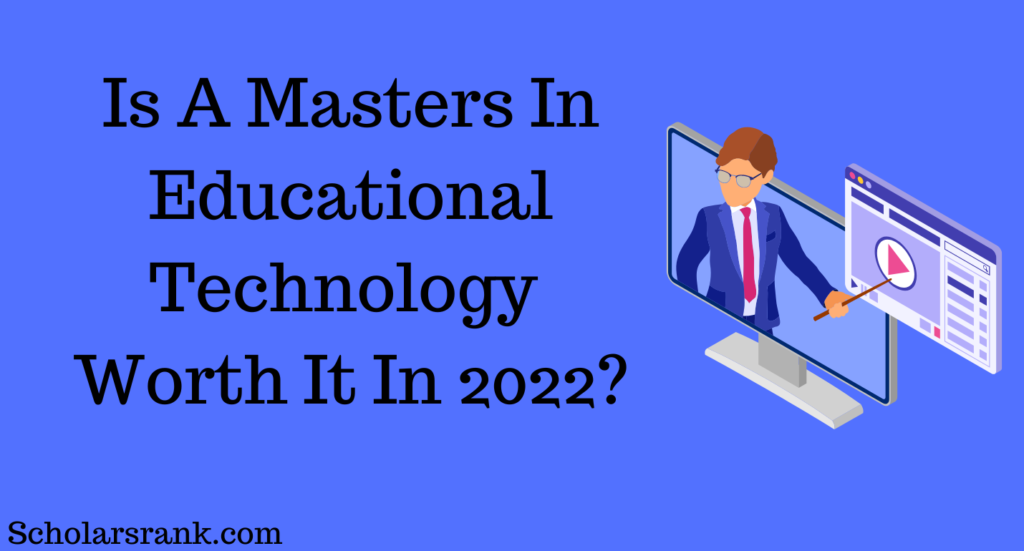Introduction
Is A Masters In Educational Technology Worth It? The way people learn can significantly be altered by technology. It can strengthen and enhance connections between teachers and students, reimagine methods for learning and teamwork, close long-standing equity and accessibility gaps, and modify educational experiences to accommodate the requirements of all students.
Technology can be used by teachers to imitate real-world learning opportunities and give pupils access to research materials. Technology also broadens access to education, particularly as institutions adapted to distance learning in the wake of the COVID-19 pandemic.
Each year, $13.2 billion is spent by educational institutions on educational technology. Nevertheless, providing a student with a gadget is not enough to use technology in the classroom effectively.
Students who complete the master’s degree program in educational technology are prepared to create, develop, and assess learning technology environments, systems, applications, and teaching materials. The teachers who would be working with those pupils are also intended users of educational technologies.
What Is Educational Technology

The setting up of learning or a vision of learning made possible by technology takes place in educational technology, which is also referred to as instructional technology. Utilizing all available tools, including technology, educational technology or instructional technology can also address issues and challenges related to education. However, to deliver authentic learning experiences and fully realize the advantages of technology in our educational system, educators must properly integrate technology into their work. Additionally, all parties involved in education should pledge to cooperate in using technology to advance education. Leaders, educators, researchers, policymakers, financiers, technology developers, members of the community and organizations, as well as students and their families, are some of these stakeholders.
What Is A Masters In Educational Technology
There is a huge demand for people who can make it happen seamlessly, given how quickly technology is developing and how often teachers and administrators need to use it to reach our students.
With a master’s degree in educational technology, you can go one step further and seek careers as an instructional specialist or school consultant, carry on working with teachers and administrators, and advance into leadership positions as a result of your training and experience.
A master’s degree in educational technology is frequently needed to get the state certification that is required to work as a district or campus administrator, elevating one to a position of greater leadership.
You can now use what you gained as a team member to lead and grow that department, campus, or possibly even a district if you have a master’s in educational technology.
Things To Take Note Of Before Enrolling In An Education Technology Master’s Program.
- What kind of experience is required to earn a master’s degree in educational technology?
Three to four years of appropriate job experience are required, depending on the situation. Texas requires three years of classroom experience before allowing someone to advance into an administration position. Additionally, a bachelor’s degree is required before pursuing a master’s degree.
- How long and how much effort will it take to get this degree?
Much of this will depend on your circumstances. Online degrees are now significantly simpler to earn thanks to colleges and universities. Depending on the university, students may be able to complete their master’s degree in 12 to 18 months, however, most offered two years and some mentioned three to four years for part-time students.
The amount of time you feel like you can devote to your studies while juggling work, family, and other obligations will determine how quickly you complete this degree.
- What are your career goals?
Do you think you can utilize technology to teach others how to teach better and have more successful students? Do you consider yourself capable of teaching people how to use technology in the classroom? Do you believe you have what it takes to guide a team of individuals toward achieving a department’s, campus, or district’s objectives? If you said “yes” to any of the questions, getting a master’s in education technology might be one of your career goals. It will enable you to pursue your professional goals.
Programs for Masters in Educational Technology: Curriculum and Acquired Skills
There are typically numerous specialties available for a master’s degree in educational technology or a conventional master’s in instructional technology courses, and the curriculum will vary slightly depending on the specialization. The following list includes some of the topics covered in a typical master’s degree in educational technology or a master’s degree in instructional technology. Here, we go over the curriculums and abilities covered in a normal master’s program in educational technology or a typical master’s program in educational technologies.
| Curriculum | Acquired Skills |
| Special Problems in Learning Design and Technology | In-depth examination of contemporary issues in learning design and technology chosen from areas of current interest to educators. |
| Research Methods in Technology and Instructional Design | Terms and standard methods used in qualitative and quantitative research as they relate to technology and instructional design. Conduct controlled IDT research segments and draft conceptual concepts for bigger initiatives. |
| Advanced Issues in Program Management, Implementation, and Evaluation | Utilizing computer-based instructional design ideas to provide fresh approaches and resources for teaching with technology. Project management, planning, evaluation, design concepts, and development tools using computers. Make multimedia learning materials. |
| Analysis of Technology Programs | This course examines the systematic procedure of gathering and analyzing data to ascertain whether and to what extent program objectives have been or are being achieved. |
| Issues in E-Learning and the Design Process in Instructional Design | Systematically designing educational materials, taking into account analysis, media choice, design, development, and evaluation. Learning theories, learner traits, teaching techniques, screen design, response analysis, feedback, and interactivity. |
| Behavioral Sciences Statistics II | An overview of the principles of statistical design used in behavioral science research. presenting a statistical model that depicts the organization of data gathered during a planned experiment or survey. Possibilities for employing a computer to analyze data judge a statistical model that has been provided and help with post hoc analysis methods. Multiple linear regression analysis themes, the analysis of variance, and covariance analysis are all integrated using the “Least Squares” concepts. |
| Practice in Educational Technology and Design | Techniques for successfully applying and assessing instructional design and technology to enhance learning, such as substantial fieldwork assignments in contexts related to the workplace. |
| Systematic Methods to Web Design and Development | Issues relating to using the World Wide Web for instruction include designing, developing, and implementing Web pages and sites. |
The Benefits Of Obtaining A Master’s Degree In Educational Technology
A master’s degree in educational technology opens the door to someone who not only possesses the instructional skills necessary to use technology effectively in the classroom, but also the interpersonal abilities necessary to simultaneously empower and develop team members. Simply put, earning a master’s in educational technology opens doors for you that you might not have otherwise been able to.
- Career Opportunities
The job options for master’s degree holders in educational technology are not district- or campus-specific.
The corporations that educate the teachers, sell us new products and even design the things that will be utilized in the classroom need people who are knowledgeable about technology and how to integrate it into the classroom. These businesses want somebody who can instruct and communicate about their goods.
But businesses that require excellent teachers and those who use technology to train their workforce are even further removed from the world of education.
- Increased Salary
The average salary for an instructional technologist ranges from $43,000 to $76,000, according to Educational Technology Jobs and Salaries. Ten percent of them make more than $95,000 annually. According to other studies, average incomes ranged from the mid-$60,000s to $105,000 annually.
Unsurprisingly, a master’s degree in educational technology has certain financial benefits.
Career Options For A Masters In Educational Technology
Technology is dominating our contemporary world, and educational technology plays a significant role in this. We interact digitally, make payments electronically, learn, and perform distant jobs. Today, even those who attend traditional schools must use technology in the classroom and at home. Children as early as kindergarten age can complete their education online. As a result, the field of study known as educational technology is expanding, and the careers it can lead to are listed below.
- Postsecondary Education Administrators
These administrators assist the learning and success of students in colleges and universities. A master’s degree in educational technology can be used to work in quality assurance or distance learning departments.
Postsecondary universities need people with experience in developing and using educational technology to generate course materials and develop course content as they grow their online learning platforms. The BLS estimates that the median annual pay for postsecondary administrators is $97,500.
- Educational Technologist
The most logical profession for those majoring in educational technology would seem to be an educational technologist. These people are in charge of testing and maintaining the hardware and software used by schools, teachers, and students. They serve as the educational system’s mechanics. For people who enjoy using both their hands and their brains in their work, this is a fantastic career.
The world without technology or education is unimaginable. Each makes a significant contribution to society on its own, and together they are growing even more powerful. Without a strong education and a foundation in technology, it is almost impossible to flourish in today’s society.
- High School Teachers
A bachelor’s degree and a state teaching license are requirements for high school teachers. These teachers concentrate on instructing students in grades 9 through 12. Teachers in high school frequently concentrate on a single subject, like math or English. High school teachers have a median yearly pay of $62,870, according to the BLS.
- Instructional Coordinator
The administrative team of a school system includes instructional coordinators. They check textbooks and other instructional materials for compliance with state academic requirements.
Additionally, instructional coordinators assist classroom teachers with integrating fresh resources, equipment, and software. They provide coaching and mentorship to help teachers develop their abilities. The BLS states that the median annual compensation for instructional coordinators is $66,970.
- Educational Software Designer
Every day, educators of all grade levels use educational software. They employ it to make lesson plans, finish grading, interact with parents and the school system, and keep track of attendance. Students frequently use educational software for in-class and home tasks. An educational technology degree program will equip you to create all of these programs, which must be designed by someone.
- Educational Technology Trainer
For instructors and administrators, learning to use the most recent educational software is not an easy task. The veterans who grew up with blackboards, papers, and pencils are prime examples of this. When the software is updated as well as when professors and staff are first introduced to it, someone who is an expert in the field visits the schools to provide them with full training. Graduates with degrees in educational technology are well-equipped for this position.
- Training and Development Managers
Training managers create and carry out extensive employee training programs across practically all industries. They choose training materials that best suit the employees’ learning preferences using their understanding of educational technologies.
Additionally, they monitor development and assess training efficiency. These professionals have a median yearly pay of $115,640, according to the BLS.
- Instructional Designer
For use in colleges, universities, businesses, and consumer education, instructional designers create training and educational materials. They must be proficient in program administration, content management, and user experience design. According to Payscale, instructional designers make an average of $64,830 a year.
How Difficult Is It to Find Work With a Master’s in Educational Technology?
Due to the increased importance of technology in education, finding employment with a master’s degree in educational technology is not extremely difficult. Students with this degree will be able to apply their education to e-learning, which is more common than ever.
In addition, technology is continuously developing and increasing, which enables us to discover fresh and improved ways to learn. You won’t have any trouble finding work if you acquire this degree because employers are in high demand for graduates with advanced knowledge of these technologies and techniques.
Is a Masters in Educational Technology Worth It?
A Master’s in Educational Technology is worth it if you wish to work at the director and senior levels. Graduates with master’s degrees will be paid more and have more career options than those with undergraduate degrees.
Students who complete a master’s degree will have advanced and specialized abilities that will help them excel in their careers. Additionally, they offer a more complete option than obtaining a professional qualification. A route to doctoral degrees is, finally, through master’s degrees.
Educational Technology Master’s Degree vs Educational Technology Bootcamp: Which Is Better?
An educational technology Bootcamp is inferior to a master’s degree in educational technology because the latter guarantees job advancement. Furthermore, whereas an educational technology degree gives in-depth training on all facets of the profession, boot camps assist students in developing a specific skill set.
| Benefits of a Master’s in Educational Technology | Benefits of an Educational Technology Bootcamp |
| High-Demand: Your CV will be more appealing to recruiters if you have a degree. By doing this, you’ll have a better chance of landing your ideal job and getting paid more. | Available Skills: Bootcamps are experts at teaching the computer skills that potential employers are looking for in candidates. |
| Networking: Most prominent institutions offer modest networking gatherings and sizable conferences that let students interact with and meet business people. | Flexible Planning: Programs like boot camps are frequently created to accommodate hectic schedules. Many offer classes in the evenings or on weekends, and you can attend them in person or online. |
| Increased Wages: Holders of master’s degrees in educational technology may make more money than those with undergraduate degrees. As you gain experience, your pay increases. | Affordable: A Bootcamp costs substantially less than conventional schools and institutions. |
| Personal Growth: You can learn the necessary abilities and character qualities from a degree to succeed in educational technology. | Self-Paced: Many boot camps provide self-paced tuition, allowing you to join and pursue your education at your speed without being constrained by set schedules. |
| Career Possibilities: Your advanced degree will help you advance to better chances in your chosen field once you acquire a job. | Job Services: When they enroll in a Bootcamp, students frequently get access to a wide range of career assistance. These could include career counseling, help with resume-building, and practice interviews. |
Conclusion
Is a masters in educational technology worth it? The world without technology or education is unimaginable. Each makes a significant contribution to society on its own, and together they are growing even more powerful. Without a strong education and a foundation in technology, it is almost impossible to flourish in today’s society.
Graduates with a master’s in educational technology can become leaders in publishing corporations, higher education institutions, and school systems. Between 2020 and 2030, the BLS predicts a 10% increase in employment for instructional coordinators. To meet school accountability criteria and promote student accomplishment, school systems, government organizations, and curriculum publishers all require the expertise of instructional coordinators.
Are you a technology enthusiast? Do you love instructing? Do you enjoy educating others about technology? Do you enjoy being in charge and working with both adults and students? If your answer is yes, get an Educational technology master’s degree!
Frequently Asked Questions (FAQs)
What Is The Difference Between Education Technology And Instructional Technology?
- All facets of technology utilized in education are included in educational technology. Instructional technology refers to the philosophy and practice of learning design and evaluation techniques. The improvement of the teaching and learning process is the main goal of instructional technology.
What Are The Advantages Of A Master’s Degree In Educational Technology For Teachers?
- A Master’s in Educational Technology can be quite advantageous for teachers. Through the more effective use of technology, the abilities they acquire through this degree may enable them to enhance their teaching techniques. If you want to get a better job with a higher wage, getting a master’s degree may be beneficial.
Is The Field Of Educational Technology Worth It?
- Yes, one of the highest-paying specialist careers for educators is in educational technology. For someone who appreciates both teaching or training others and working with computers, careers in instructional technology can be highly satisfying.
How Long Does It Take To Get A Master’s In Educational Technology?
- Students normally need two to three years to complete their master’s degree in educational technology or roughly 36-semester credits. A flexible learning schedule is offered by certain programs but not by others.
You can also read, “Is A Masters In Communication Worth It In 2022?“








